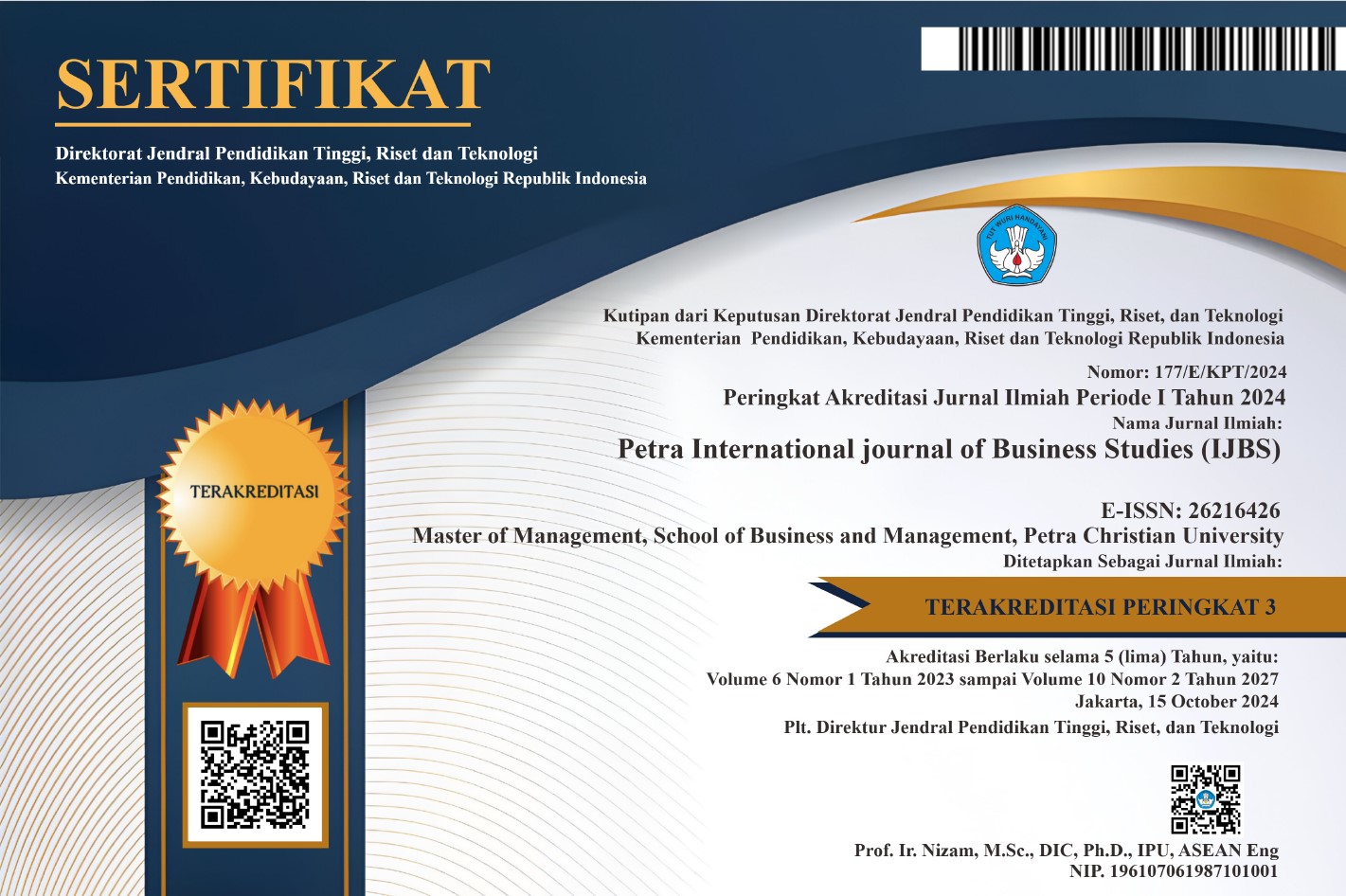The Impact of Perceived Financial Literacy and Parental Norm towards Money Management of Bidikmisi Student
DOI:
https://doi.org/10.9744/ijbs.2.2.71-77Keywords:
Perceived Financial Literacy, Parental Norms, Money Management, BidikmisiAbstract
This research examines the impact of perceived financial literacy and parental norms on money management. I collected the data by spreading online and printed questionnaires towards 100 respondents of students who got Bidikmisi scholarship from several universities in Indonesia. Then, the data was processed by SmartPLS. The result of the research shows that perceived financial literacy and parental norms significantly influence money management of students who got Bidikmisi scholarship. So, the role of parents in terms of educating the children about finance shapes the knowledge of the students to manage the scholarship to fulfill the needs of the college.
Downloads
References
Abdillah, W., & Jogiyanto. (2015). Partial Least Square (PLS)-Alternatif Structural Equation Modeling (SEM) dalam Penelitian Bisnis. Yogyakarta: 2015.
Ardiana, M. (2016). Kontrol Diri, Pendidikan Pengelolaan Keuangan Keluarga, Pengetahuan Inklusi Keuangan Siswa Pengaruhnya terhadap Perilaku Menabung siswa SMK se kota Kediri. Jurnal Ekonomi Pendidikan dan Kewirausahaan, 4(1), 57-75.
Beutler, I., & Dickson, L. (2008). Consumer Eco-nomic. J.J.Xiao,(ed), Handbook of Consumer Financial Research.
Bhushan, P., & Medury, Y. (2013, March-May). Financial Literacy and its Determinants. Inter-national Journal of Engineering, Business and Enterprise Applications, 4(1), 155-160.
Boon, T. H., Ye, H. S., & Ting, H. W. (2011). Financial literacy and personal financial planning in Klang Valley. Internasional Journal of Ecomomics and Management, 5(1), 149-168.
Clarke, M., Heaton, M., Israelsen, C., & Eggent, D. (2005, June). The acquisition of family financial roles and responsibilities. Family and Consumer Sciences Research Journal, 33(4), 321-340.
Dew, J., & Xiao, J. J. (2011, July). The Financial Management Behavior Scala: Developing and Validation. Journal of Financial Counseling and Planing, 22(1), 43-59.
Dikti, D. P. (2011, January). Bidikmisi. Retrieved from Ristekdiksi: https://ristekdikti.go.id
Dikti, D. P. (2016, February). Bidikmisi. Retrieved from Ristekdikti: https://ristekdikti.go.id
Endang, R., & Horas, D. (2018). In Modul Pengelolaan Keuangan Keluarga Miskin (p. 2). Yogyakarta: Diandra Kreatif.
Herdjiono, I., & Damanik, L. A. (2016, Desember). Pengaruh Financial Attitude, Financial Knowledge, Parental Income terhadap Financial Management Behavior. Jurnal Manajemen Teori dan Terapan, 9(3), 226-241.
Hogart, J., & Hilgert , M. (2002, March). Financial knowledge, experience and learning preferences: Preliminary results from a new survey on financial literacy. Consumer Interest Annual, 48, 1-7.
Ida, & Dwinta, C. Y. (2010). Pengaruh Locus of Control, Financial Knowledge, Income terhadap Financial Management Behavior. Jurnal Bisnis dan Akuntansi, 131-144.
Kholilah, N. A., & Iramani, R. (2013, May). Studi Financial Management Behavior Pada Masyarakat Surabaya. Journal of Business and Banking, 3(1), 69-80.
Khuon, T. (2015, January 29). Personality Develop-ment for a Changing World: agilelifestyle.net. Retrieved from Agilelifestyle.net: http://agilelife-style.net/personal-cash-management-strategies
Luzardi, A., & Mitchell, O. S. (2014, December 2). The Economic Importance of Financial Lite-racy:Teory Evidence. Journal of Economic Literature, 52(1), 1-40.
Mien, N. T., & Thao, T. P. (2015). Factors Affecting Personal Financial Management Behavior: Evidence from Vietnam. Proceedings of the Second Asia-Pacific Conference on Global Business, Economics, Finance, and Social Sciences.
Mulyadi, S., & Trizki, L. (2012). Financial Parenting. Jakarta: Noura Books.
Perry, V. G., & Morris, M. D. (2005). Who Is in Control? The Role of Self-perception, Knowledge, and Income in Explaining Cunsumer Financial Behavior. The Journal pf Consumer Affairs, 39, 299-313.
Raaij, W. F. (2016). Understanding Consumer Financial Behavior. Europe: Palgrave Macmillan.
Remud, D. L. (2010). Financial Literacy Explicated: The Case for a Clearer Definition in an Increasingly Complex Economy. The Journal of Consumer Affairs, 44(2), 276-295.
Rostiana, E., & Djulius, H. (2018, Mei). Modul Pengelolaan Keuangan Miskin. Sleman, Yogyakarta, Indonesia: Diandra Kreatif.
Roudik, R. (2018, August 9). Blog : Halt Buzas & Powell. Retrieved from Halt Buzas & Powell Web Site: https://www.cpas4you.com/budgeting-and-cash-management-what-you-need-to-know/
Sheela Devi D. Sundarasen, & Muhammad Sabbir Rahman. (2017). Attitude Towards : Mediation to Money Management. Academy of Accounting and Financial Studies Journal, 21(1), 1-17.
Shim, S., Xiao, J. J., Barber, B. L., & Serido, J. (2009). Financial Socialization of First-Year College Students: The Roles of Parents, Work, and Education. Journal Youth Adolescence, 39(12). Retrieved July 4, 2009
Simkiv, M. (2013). Money attitude of Ukrainian young people: socio-demograpic aspect. Journal of Education Culture and Society(2), 36-45.
Solheim, C., Zuiker, V., & Levchenko, P. (2011). Financial Socialization Family Pathways : Reflection from College Student's Narratives. Financial Science Review, 16(2), 97-112.
Vitt, L., & Siegenthaler, J. K. (2000, January). Personal Finance and the Rush to Competence: Financial Lliteracy Education in the U.S. Middleburg: ResearchGate.
Widdowson, D., & Hailwood, K. (2007). Financial literacy and its role in promoting a sound financial system. Reserve Bank of New Zealand: Bulletin, 70(2), 37-47.
Yulianti, N., & Silvy, M. (2013, May). Sikap Pengelolaan Keuangan dan Perilaku Perencanaan Investasi Keluarga di Surabaya. Journal of Business and Banking, 3(1), 57-68. doi:http://dx.doi. org/10.14414/jbb.v3i1.254
Additional Files
Published
Issue
Section
License
Petra IJBS (e-ISSN: 2621-6426) is published by Master of Management program, School of Business and Management, Petra Christian University, Indonesia (MM SBM PCU).












